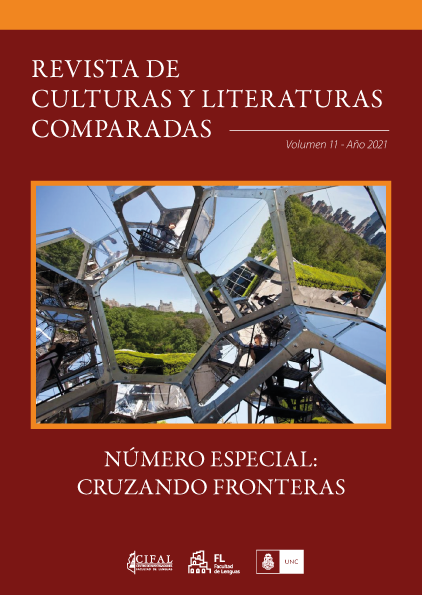Sobrevivir en la memoria de los otros: la presencia del Gran Inquisidor de Dostoievski en San Manuel Bueno, mártir de Miguel de Unamuno
Palavras-chave:
Unamuno, Dostoievski, Fe y razón, San Manuel Bueno, mártir, Los hermanos KaramazovResumo
El investigador ruso Vsévolod Bagno (1994) afirma la “indudable afinidad” que existe entre España y Rusia como encrucijadas culturales entre Oriente y Occidente. En una carta a Ganivet de 1898, Unamuno confesaba, por su parte: “Siempre estuve convencido de que existe una similitud esencial entre el carácter nacional del pueblo español y el del ruso: la resignación, la actitud ante la vida, la serena religiosidad de su gente, las aspiraciones e impulsos místicos de los elegidos…” Tal como escribe en 1915, “Dostoievski es mi principal fuente respecto a Rusia (…) Yo hago votos por el triunfo de la concepción y el sentimiento que de la vida y del mundo tenía Dostoievski”. Según entiende la crítica, Rusia sirvió al bilbaíno “como un campo de experimentos sobre ideas e imágenes que le interesaban más que la realidad rusa: el problema de España, el problema de la humanidad, el problema de la inmortalidad del alma” (Korkonosenko: 2000). La breve novela unamuniana San Manuel Bueno, mártir (1931) reconsidera “La leyenda del Gran Inquisidor”, un capítulo de Los hermanos Karamazov (1881) de Dostoievski, para abordar la cuestión de la fe religiosa y la creencia en un ser superior que dé sentido a la vida del hombre, dos temas caros a las preocupaciones vitales del escritor español. En nuestro trabajo analizaremos comparativamente afinidades y diferencias entre las obras propuestas y el sistema de ideas de sus autores.
Downloads
Referências
Bagnó, Vsévolod. “España y Rusia: culturas de frontera entre Oriente y Occidente”. Actas del XIII Congreso de la Asociación Internacional de Hispanistas. (2000) Web. 14 agosto 2017.
Castaños Alés Enrique. “San Manuel Bueno, mártir: existencia, duda y fe.” Gibralfaro. Revista de Creación Literaria y Humanidades. Octubre-diciembre (2013).
Djermanovic Tamara. “Dostoyevski en el espejo del pensamiento español”. Cuadernos Hispanoamericanos 777 (2015): 4-20.
Dostoievski, Fiodor. Los hermanos Karamazov. Trad. Augusto Vidal. Madrid: Alianza Editorial, 2011.
Freud, Sigmund. Obras Completas. Madrid: Biblioteca Nueva, 1973.
Godoy, Gustavo J. “Dos mártires de la fe según Dostoyveski y Unamuno”. Cuadernos de la Cátedra Miguel de Unamuno. 20 (1970). Web. 9 septiembre 2017.
González Martín, Vicente. “Unamuno y la cultura rusa”. Cuadernos de la Cátedra Miguel de Unamuno. 27-28 (1982): 85-101. Web. 6 septiembre 2017.
Hauser, Arnold. Historia social de la literatura y el arte. Barcelona: Debate, 2006.
Korkonosenko, Kirill. “Miguel de Unamuno, "un extraño rusófilo"”. Cuadernos de la Cátedra Miguel de Unamuno 35 (2000): 13-25. Web. 6 septiembre 2017.
---. “Tolstói, Dostoiévski y la generación del 98”. Lev Tolstói en el mundo contemporáneo. Ed. Nina Kressova. Granada. Comares, 2011: 43-52.
Lissorgues, Yvan. “La novela rusa en España (1886-1910)”. La literatura española del siglo XIX y las literaturas europeas. V Coloquio Sociedad de Literatura Española del Siglo XIX. (2011): 287-310. Web. 5 septiembre 2017.
Morillas Esteban, Jordi. “F. M. Dostoievski en España”. Mundo eslavo: revista de cultura y estudios eslavos 10 (2011): 119-143. Web. 5 septiembre 2017.
Navarra Ordoño, Andreu. El espejo blanco. La rusofilia española. Madrid: Fórcola Ediciones, 2016.
Pujals Ramírez, Sandra. “En cuerpo y alma: Rusia y España bajo perspectiva transnacional”. Cuadernos de historia contemporánea 38 (2016): 11-14. Web. 4 setiembre 2017.
Rebón, Marta. “¿Por qué Dostoievski tardó en llegar a España?”. Russia beyond the headlines. Web. 20 octubre 2015.
Unamuno, Miguel de. Obras completas. Madrid: Afrodisio Aguado, 1958.
---. Obras completas. Madrid: Escelicer, 1971.
---. Del sentimiento trágico de la vida. Akal: Madrid, 1983.
---. San Manuel Bueno, mártir. Obras Completas, tomo II. Madrid: Afrodisio Aguado, 1958.
Downloads
Publicado
Edição
Seção
Licença

Este trabalho está licenciado sob uma licença Creative Commons Attribution-NonCommercial-NoDerivatives 4.0 International License.
Aquellos/as autores/as que tengan publicaciones con esta revista, aceptan los términos siguientes:
a) Los/as autores/as conservarán sus derechos de autor y garantizarán a la revista el derecho de primera publicación de su obra, el cual estará simultáneamente sujeto a la Licencia de reconocimiento de Creative Commons.
b) La cesión de derechos no exclusivos implica que la publicación de los artículos en la presente revista no quita la posibilidad o el derecho al autor/a de publicar su obra de manera posterior en otras revistas u órganos editoriales y la autorización por parte de los/as autores/as para que el trabajo sea depositado en los repositorios institucionales, tales como el Portal de Revistas de la Universidad Nacional de Córdoba.



